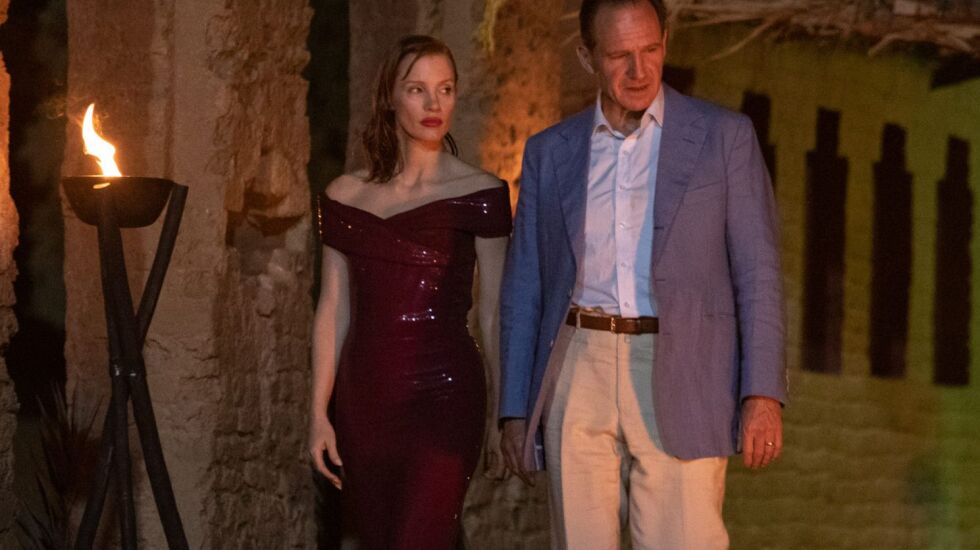
Not only are “The Forgiven” leads Jessica Chastain and Ralph Fiennes among our very best actors, they have a timeless quality that leads one to believe they’d be stars in any era. I can easily picture Fiennes in a supporting role in, say, “Casablanca” (1942), while Chastain would seem right at home in a picture such as “Gilda” (1946) or “House of Strangers” (1949).
Chastain and Fiennes are perfectly cast as a privileged married couple who might still love each other but clearly can’t stand each other in John Michael McDonagh’s dark and lurid Moroccan film noir “The Forgiven,” which is set in present day but if we take out the cell phones and a few other modern touches, this, too, has a timeless quality and feels like something straight out of the 1940s. It’s a wonderful movie about mostly terrible people who treat the death of a local boy as an inconvenience that interrupts their weekend getaway and must be dealt with, and what a bother the whole thing is — and it’s that kind of attitude that can lead to some dire comeuppances.
Shot on location in Morocco (with a six-month pause in production due to the pandemic), based on a 2012 novel by Lawrence Osborne and lensed in beautiful fashion by director McDonagh and cinematographer Larry Smith, “The Forgiven” begins with the American writer Jo Henninger (Chastain) and her British doctor husband of 12 years, David (Fiennes), sniping at one another as they embark on a trip to North Africa. David winces at Jo’s prattling and calls her “shrill,” while Jo calls David a “highly functional alcoholic” as he empties another bottle of wine and makes disparaging remarks about the tourists at a posh hotel where they’re biding time before setting out on a long, nighttime drive through winding desert roads in order to reach a lavishly renovated ksar in the High Atlas Mountains. This former village is now a kind of fortress/hotel owned by their wealthy and hedonistic friend Richard (Matt Smith), who with his outrageously awful boyfriend Dally (Caleb Landry Jones) is hosting an opulent weekend gathering.
By this time, we’ve also met a boy named Driss (Omar Ghazaoui), who, like many of the locals, carves out a living by digging up fossils, painting and mounting them and selling them to Westerners. With a drunken David behind the wheel in the dark of night, Driss steps in front of the Henningers’ car and is struck and killed. The Henningers arrive at the resort and almost casually inform Richard that there’s a dead body in their car. While David and Jo wash up and change and then indulge in a late dinner, Richard contacts the local authorities, who rule the boy’s death an accident. All will be smoothed out, it seems — until Driss’ father, Abdellah (Ismael Kanater), arrives at the gates of the resort and requests/demands that David accompany him and the boy’s body to their village. This seems fraught with peril — “they could be ISIS!” wails Jo — but David agrees to accompany Abdellah, along with the driver-translator Anouar (Saïd Taghmaoui), who will act as the go-between and perhaps peacemaker on this long and dangerous journey.
The crisp editing takes us back and forth between David’s journey, in which he begins to see the locals and their culture as more than just background scenery for his vacation, and the nonstop partying back at the lavishly appointed castle resort. Jo feigns worry over David while embarking on an openly flirtatious assignation with a sexed-up financial analyst named Tom (Christopher Abbott), eventually dressing up in a bondage outfit, snorting cocaine and getting down to frisky business with Tom. The out-of-control Australian model Cody (Abbey Lee) gets so wasted she wakes up in the desert, hundreds of yards from the resort, while a French photographer from the New York Times Style Section chronicles the debauchery while we’re pretty sure she thinks Richard and his friends are shallow, narcissistic fools. (She’s … not wrong.)
“The Forgiven” exists in a world where the Westerners might as well be Imperialists, as they flaunt their excessive ways in view of staffers and locals who follow an entirely different way of life. Thanks to the nuanced performances by the ensemble cast and the rich writing, certain characters who seem to be narrowly defined become something more complex as the story unwinds. From the moment of the accident, David says he’s sorry for what happened, but mostly because it’s such a damn imposition. That changes along the way. Whether or not there’s time and room for David to be forgiven — I’ll leave that for you to discover. Suffice to say “The Forgiven” holds us in its grips until the very last frame.



.png?w=600)



